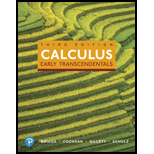
Concept explainers
How do you modify the graph of
Trending nowThis is a popular solution!

Chapter 1 Solutions
Calculus: Early Transcendentals (3rd Edition)
Additional Math Textbook Solutions
Thomas' Calculus: Early Transcendentals (14th Edition)
Glencoe Math Accelerated, Student Edition
University Calculus: Early Transcendentals (3rd Edition)
Precalculus: Concepts Through Functions, A Unit Circle Approach to Trigonometry (4th Edition)
Calculus, Single Variable: Early Transcendentals (3rd Edition)
- How do you find the domain for the composition of two functions, fg ?arrow_forwardHow do the graphs of the functions f(x)=x2 and f(x)=x21 differ? We graphed them at the start of this section. What is the difference between their graphs? How are their graphs the same?arrow_forwardWhat is the advantage of knowing how to recognizetransformations of the graph of a parent functionalgebraically?arrow_forward
- During a nine-hour snowstorm, it snows at a rate of 1 inch per hour for the first 2 hours, at a rate of 2 inches per hour for the next 6 hours, and at a rate of 0.5 inch per hour for the final hour. Write and graph a piecewise-defined function that gives the depth of the snow during the snowstorm. How many inches of snow accumulated from the storm?arrow_forwardWhy does the horizontal line test tell us whether the graph of a function is one-to-one?arrow_forwardSketch the graph of fx=5e0.17x.arrow_forward
- If xis large, which function grows faster, f(x)=2x or g(x)=x2?arrow_forwardWhen examining the formula of a function that is the result of multiple transformations, how can you tell a horizontal stretch from a vertical stretch?arrow_forwardWhen examining the formula of a function that is the result of multiple transformations, how can you tell a horizontal compression from a vertical compression?arrow_forward
- When examining the formula of a function that is the result of multiple transformations, how can you tell a reflection with respect to the x-axis from a reflection with respect to the y-axis?arrow_forwardbThe average rate of change of the linear function f(x)=3x+5 between any two points is ________.arrow_forwardFor the fallowing exercises, find the x- and y-intercepts of the graphs of each function. 11. f(x)=2x+1+6arrow_forward
- Algebra & Trigonometry with Analytic GeometryAlgebraISBN:9781133382119Author:SwokowskiPublisher:Cengage
 Big Ideas Math A Bridge To Success Algebra 1: Stu...AlgebraISBN:9781680331141Author:HOUGHTON MIFFLIN HARCOURTPublisher:Houghton Mifflin Harcourt
Big Ideas Math A Bridge To Success Algebra 1: Stu...AlgebraISBN:9781680331141Author:HOUGHTON MIFFLIN HARCOURTPublisher:Houghton Mifflin Harcourt

 College AlgebraAlgebraISBN:9781305115545Author:James Stewart, Lothar Redlin, Saleem WatsonPublisher:Cengage Learning
College AlgebraAlgebraISBN:9781305115545Author:James Stewart, Lothar Redlin, Saleem WatsonPublisher:Cengage Learning Algebra: Structure And Method, Book 1AlgebraISBN:9780395977224Author:Richard G. Brown, Mary P. Dolciani, Robert H. Sorgenfrey, William L. ColePublisher:McDougal Littell
Algebra: Structure And Method, Book 1AlgebraISBN:9780395977224Author:Richard G. Brown, Mary P. Dolciani, Robert H. Sorgenfrey, William L. ColePublisher:McDougal Littell





